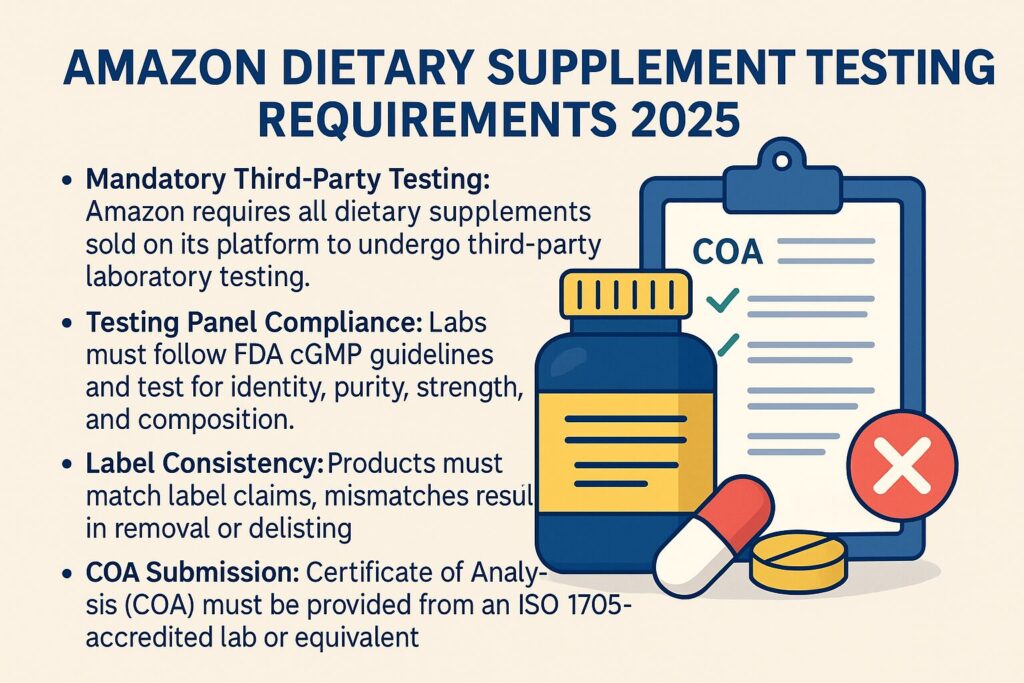Overview
- Amazon dietary supplement testing is mandatory for all supplement listings on the platform.
- Products must be tested by third-party labs that follow FDA cGMP and ISO 17025 accreditation standards.
- Each supplement batch requires a Certificate of Analysis (COA) to verify identity, potency, and purity.
- Products must align with label claims—mismatches may result in listing removal.
- Amazon bans certain ingredients and health claims, which are enforced through testing compliance.
Introduction
In 2025, Amazon dietary supplement testing has become a critical checkpoint for any brand selling on the marketplace. This process is no longer optional—it’s a required part of Amazon’s seller compliance system. With increasing FDA oversight and consumer demand for transparency, Amazon has implemented strict standards around testing, documentation, and label accuracy. This guide walks you through everything you need to know to stay compliant and competitive.
1. What Is Amazon Dietary Supplement Testing?
Amazon dietary supplement testing refers to the third-party analysis and documentation Amazon requires for any dietary supplement product listed on its platform. The goal is to ensure that:
- Label claims match laboratory results
- No banned substances are present
- Products are microbiologically safe and free of heavy metal contamination
Testing is generally required per batch or lot, and Amazon reserves the right to request reanalysis or additional documentation at any time.
2. Third-Party Lab Requirements
For a lab to qualify for Amazon dietary supplement testing, it must:
- Be ISO 17025 accredited
- Follow FDA cGMP (21 CFR Part 111) standards
- Provide results for all required testing categories
Required Testing Categories:
- Microbial Testing: Total Plate Count, Yeast & Mold, E. coli, Salmonella, Staph
- Heavy Metals: Lead, Arsenic, Mercury, Cadmium (via ICP-MS)
- Potency Verification: Active ingredients using HPLC, UV-VIS, or GC-MS
- Prohibited Compounds: Screening for illegal APIs, adulterants, or synthetic analogs
3. Certificate of Analysis (COA) Requirements
A COA is the most crucial document in the Amazon dietary supplement testing process. It must be:
- From an independent, certified lab
- Specific to the lot/batch of product being sold
- Consistent with your product label
Required COA Components:
- Product and batch number
- Testing methodology
- Detailed results (quantitative and pass/fail)
- Testing date
- Lab name, accreditation details, and analyst signature
4. Label Accuracy & Health Claims
Amazon reviews COAs to ensure that the testing data supports your label claims. If you say your product contains 500mg Vitamin C but the lab finds 300mg, your listing may be suspended.
Amazon also prohibits unapproved health claims, including:
- “Treats cancer”
- “Cures depression”
- “Prevents COVID”
Stick to structure/function claims that comply with FDA and FTC standards.
5. Banned and Restricted Ingredients
Your product will fail Amazon dietary supplement testing if it contains any banned substances. Amazon’s internal banned list includes:
- DMAA
- Kratom
- SARMs (e.g., Ostarine)
- Yohimbine
- Human Growth Hormone or derivatives
Even if a substance is technically legal in certain states or countries, Amazon’s policy overrides that legality.
6. Monitoring and Ongoing Compliance
Passing Amazon dietary supplement testing once is not the end of the road. Amazon may request:
- Annual COA renewal
- Reverification due to consumer complaints or new ingredient bans
- Additional documentation such as MSDS, product specs, or supply chain transparency
High-risk categories like nootropics, testosterone boosters, and fat burners face stricter audits.
7. Best Practices for Amazon Sellers
To stay compliant and avoid costly disruptions:
- Use a well-known ISO 17025-accredited lab
- Keep detailed batch records, COAs, and raw material specs
- Monitor changes to Amazon’s restricted products list
- Prepare for mock audits using your compliance documents
If possible, choose labs that specialize in Amazon dietary supplement testing—they’ll understand Amazon’s documentation format, turnaround times, and audit triggers.
Frequently Asked Questions (FAQ)
What is Amazon dietary supplement testing?
It’s Amazon’s requirement that all supplements sold on the platform be tested by an accredited third-party lab to verify safety, quality, and label accuracy.
Is Amazon dietary supplement testing required for every product?
Yes. All new listings and existing products must have batch-specific COAs that meet Amazon’s requirements.
What if I don’t comply?
Your listing may be suppressed, delisted, or even permanently banned from the platform.
Can I use my manufacturer’s in-house COA?
No. Amazon requires a third-party COA from a lab not affiliated with the manufacturing process.
How often do I need to retest?
Typically, once per new batch or annually—whichever comes first. However, higher-risk categories may require more frequent testing.
Conclusion
If you want to sell supplements on Amazon in 2025, Amazon dietary supplement testing is non-negotiable. Failure to comply can mean lost revenue, product removals, or account suspensions. But with a solid testing partner and well-organized documentation, you can turn Amazon’s rigorous standards into a competitive advantage.
Looking for a trusted lab to perform Amazon dietary supplement testing for your product? Submit Request for Quote
Read related articles:
Why Third-Party Testing is Crucial for Amazon Product Approval?
Top 10 Common Amazon Compliance Issues and How to Avoid Them





